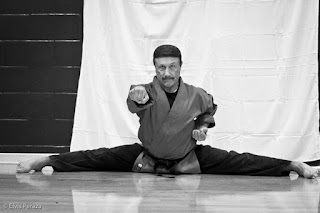 |
| The life-blood of writers... |
 |
| Pictured: Kevin Hart Wisdom |
But there's another group that sits at coffee shops. I'm talking about the douche-bag wannabes that show up so they can make a great show of "writing" in public. Keep in mind, if you go to coffee shops to write, and actually write, I'm not talking about you. Jog on. But, sitting near the writers, is that guy. You know the one. I'll give you an example.
I was at a coffee shop once, not to write but to drink coffee. As I said, I can't work in coffee shops. A fellow walked in with his hair swept up in a man-bun/topknot, an unseasonal scarf (it was summer), a wispy beard, and converse high-tops. He was also carrying a black case, the like of which I've not seen in years, and hope to never see in motion again. He ordered his coffee (I wasn't really paying attention at this point because, as I said, I don't go to coffee shops to write) then sat down at a table. From the case, he pulled, I kid you not, an old Royal typewriter.
 |
| One of these bad-boys... |
The first thing anyone should know about a Royal typewriter is that they're noisy as hell. I mean, they are as jarring as gunfire. Second, there is no spellcheck, no correction, and, in many cases, no auto-return. And when you do hit return, it jars the whole table. He loaded his paper and began his aural assault. The writers (the real ones) that were there were greatly annoyed. Especially when he struck up a jaunty (and loud) conversation about his latest opus, and how it was probably to forward-thinking to ever get published by a mainstream publisher, so he'd probably have to self-publish it.
 |
| Pictured: Rage Rising |
I'm not sure if he was a writer, a wannabe, or a performance artist who was parody-ing all the writers that hang out in coffee shops. In this case, however, it was fairly obvious that whatever he was, there was one additional thing that could not be denied. He was an ass-flapping douchebag.
So how, I hear you ask, can I tell the writers from the non-writers? How can I tell if I am a writer? How can I not be like Douchy McDoucherton who will assuredly win the Putz-Puller Prize of the year? Calm down. Listen... Here's how you tell the real writers from the not so real writers.
In my experience, most writers (in coffee shops and otherwise) are very focused on their work, and dislike being disturbed. They don't loudly talk about their work, and you rarely see them look up from their keyboards. Why? Because we're writing. Sure, we're perfectly willing to talk about our projects, but when we're working, it's not a good idea. See, it takes a while to get into the headspace we have to be in to be creative. And if you break that concentration, we can't pick up where we left off... We have to try to get back to that place.
But here's how to know if you are a writer:
YOU ACTUALLY WRITE.
No, really. You don't go to show off how creative you are. You don't draw attention to yourself in hopes that someone will want to strike up a conversation about your work. You don't act like a snob about the type of coffee or beer or whatever. You, in fact, sit your keister in a chair and you put fingers to keys, and you write. End of story. You want to be a published author? You have to write something first. You're not a writer, no matter what you do, if you don't write. No matter what you wear, what you drink, who you talk to, what school you go to, or how many books about writing you read, you are not a writer if you don't actually sit down and write.
 |
| Yup. |
And leave the goddamned antique typewriter at home.
Until next time...
SAJ








